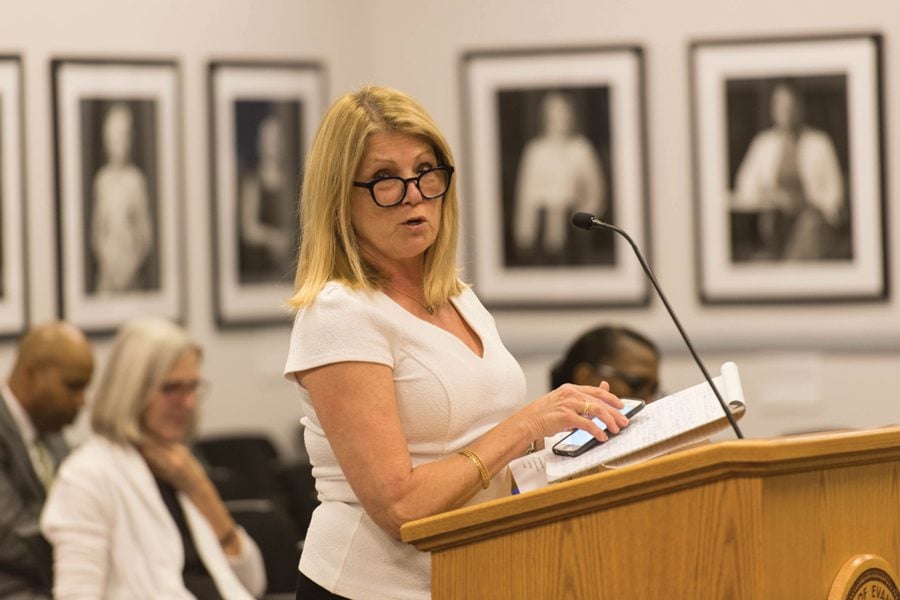District 65 social workers discuss inequity in mental health at board meeting
Daily file photo by Katie Pach
Mental Health Board chair Karin Ruetzel speaks at a Human Services Committee meeting. At Thursday’s Mental Health Board meeting, a panel of middle and elementary school social workers discussed the inequality of mental health services in Evanston.
May 11, 2018
Margaret Rothe, a social worker in Evanston/Skokie District 65, said she has never seen the rate of mental health-related hospitalization among middle school students as high as it is now. This year, she said she has had around 20 students hospitalized, all around 12 to 14 years old, and some of them multiple times.
Rothe predominantly works at Nichols Middle School, which she said has a population of bilingual and refugee students. She added that the inequity in mental health services she sees between the students who live on the North Shore and those who are non-English speaking or low-income is “startling.”
“I’ve been doing this in the district 25 years now, (in) pretty much every elementary school, pretty much every middle school, and I’m on second- and sometimes third-generation families,” Rothe said. “I get the same people over and over. We’re not doing a good job of breaking the cycle.”
Rothe spoke on a panel with two other district social workers at a Mental Health Board meeting Thursday at the Lorraine H. Morton Civic Center. She discussed the inequality of mental health services along with Paola Flores, who mainly works at Chute Middle School, and Jennifer Bergner from Oakton Elementary School.
Board chair Karin Ruetzel told The Daily that Patricia Efiom, the city’s equity and empowerment coordinator, gave a mandate to a number of agencies to look at the issue of equity in Evanston more closely.
Bergner said many of the students she works with are homeless or do not have a stable home. She said the quality of services for families on public assistance is “frightening,” adding that it is difficult for many to navigate the system of finding and paying for mental health services.
“When I came to Evanston after working in the South Side of Chicago, I was like, ‘This place is like the lottery,’” Bergner said. “We have so much here. But we have so much for certain people. … There really is such a significant difference in opportunities.”
Flores said Chute has one of the largest Latinx populations of the middle schools in Evanston and a large refugee population as well. She said a number of students need services in languages including Arabic, Swahili and Spanish, but she has found it is difficult to find sufficient translation services.
She added that the area is a “desert” for second-language services, and many of the programs and initiatives that have aimed to decrease inequality have had inconsistent results. She said families would benefit from a more stable mental health facility in the district.
“What we need is something that is committed to a long-term process and to grow with our district, to be open to equity, to being culturally sensitive to the needs of a different, growing student population,” Flores said. “So many of our families experience a lot of instability that the consistency they do see is in the relationships they establish with staff at school and with us.”
While Ruetzel told The Daily the board can recommend that the city fund programs to better address equity issues, she said the upcoming possible budget cuts may make funding recommendations difficult to figure out.
She said there is a great need for mental health services, and both the city and residents should make the need a priority.
“(We) heard how acute the needs are,” Ruetzel said, “and we need support from the community to make sure that the funding is still there.”
Email: [email protected]
Twitter: @sn_handler


